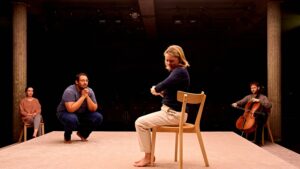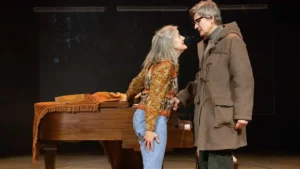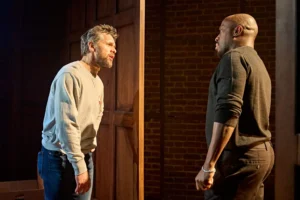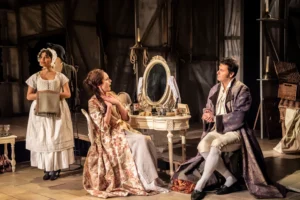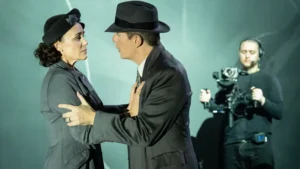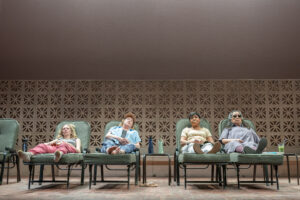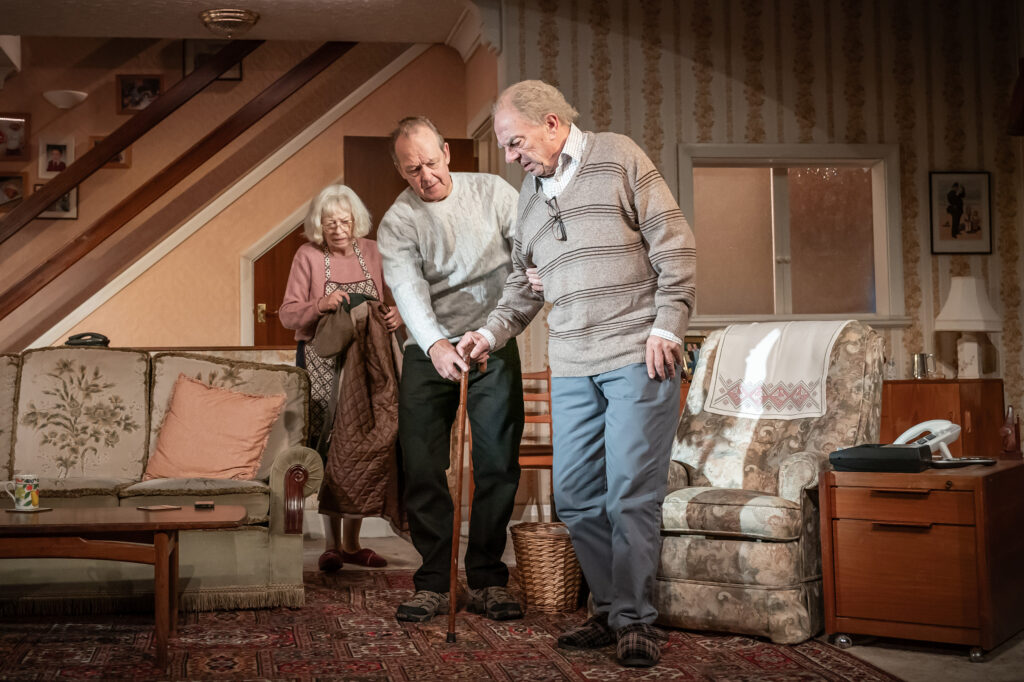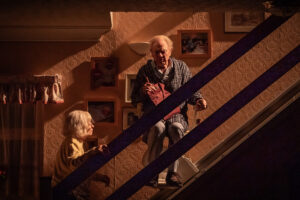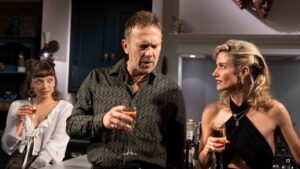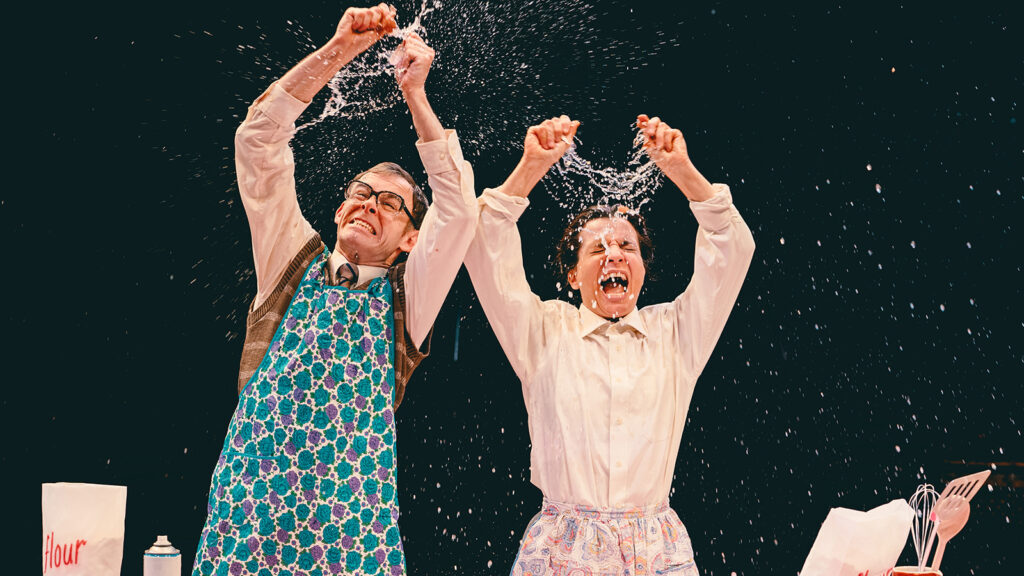Donmar Warehouse
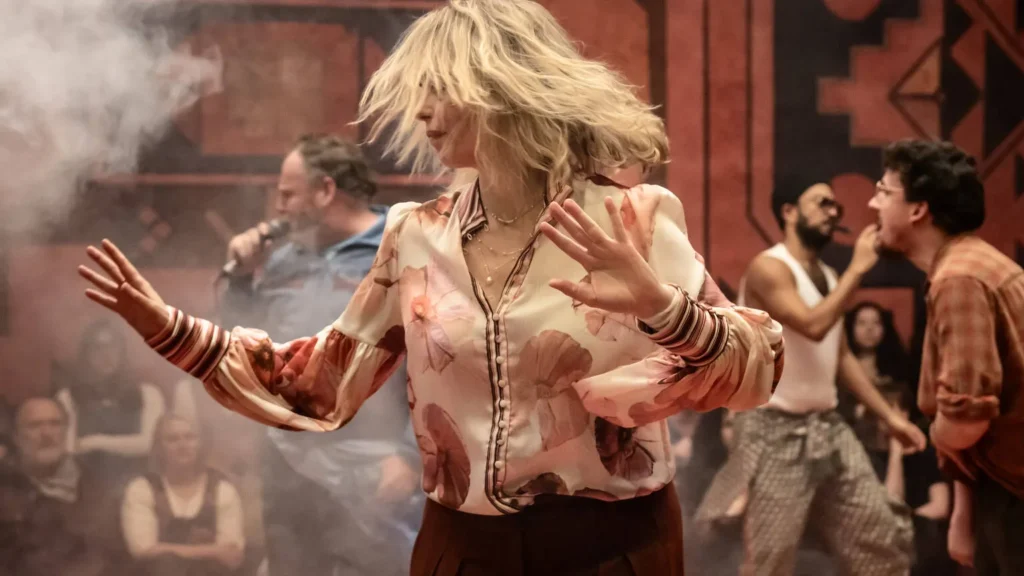
Benedict Andrews has pulled apart Chekhov’s story of an aristocratic family blind to change and reassembled it as a modern take on resistance to climate change, with the production spilling over into the audience. The excitement of three 5-star and three 4-star reviews of The Cherry Orchard was offset by a couple of 3-star reviews and one 2-star. It seems one critic’s modern interpretation is another’s gimmick. All were agreed on the quality of the cast, in particular Nina Hoss and Adeel Akthar.
[Links to full reviews are included but a number are behind paywalls and therefore may not be accessible]
Arifa Akbar in The Guardian (5★) explained the update: ‘It is still a story about masters, peasants and the legacy of serfdom, but the anxiety over wealth, class and dispossession is powerfully felt to be ours too.’ She loved the acting, ‘Hoss and Akhtar, both better known for their screen work, are tremendous’ as well as the interpretation, ‘It is not so much tragicomic as comedy and then absolute tragedy.’ The Standard‘s Nick Curtis (5★) was similarly enraptured, calling the production ‘revelatory’. It ‘hits the play’s poles of tragedy and comedy with devastating accuracy,’ he said, ‘Yet it all feels entirely true to the spirit of the original.’ He too was impressed by the acting: ‘German stage star Nina Hoss is heartbreaking and exasperating…Adeel Akhtar, so often cast in downtrodden roles, is astonishing.’ He continued: ‘I’ve never seen an audience laugh so hard at this play, nor seen the closing scene with servant Firs performed as movingly’.
Andrzej Lukowski of Time Out (5★) described the design: ‘Magda Willa has created something equally memorable. In an in-the-round configuration in which cast members sit amongst the audience when not performing, every inch of floor and the entire back hall is covered in geometrically patterned rugs, a mix of ‘70s palette and ‘80s design that feels curiously out of time.’ He explained: ‘What Andrews is just plain astonishing at is character and casting…it’s a wonder to spend time with these people’ He concluded: ‘It builds to a queasily brilliant climax, But it’s the journey that’s the joy.’
Dave Fargnoli The Stage (4★) appeared relieved to be confronted by a modern take: ‘this lively, irreverent version brings tremendous immediacy to the piece. Replacing Chekhov’s stultifying tension with raw, feverish anxiety.’ He too praised the cast: ‘In an appealingly playful ensemble, Adeel Akhtar stands out.’ For Greg Stewart at Theatre Weekly (4★) it was ‘a captivating and visionary take on the Russian playwright’s final work…Benedict Andrews’ The Cherry Orchard transposes the societal upheaval of early 20th century Russia to modern day societal shifts, and amplifies Chekhov’s themes of change and progress in a profound way.’
Claire Allfree in the Telegraph (4★) said the production ‘ratchets up the characters’ psychological fracturing to such an extent the play fizzes from the get-go with a dangerous off-kilter threat.’ She described how ‘Andrews’ production is ultimately almost entirely an exercise in tonal dissonance. The mood can switch from comedy to horror in a second. He has the ability to turn a moment inside out so that feeling is revealed by its opposite emotion.’ But she ended with a reservation: ‘You miss, despite everything, the ineffable music of Chekhov; that keening inner poetry that can pounce just as bitterly as any directorial gimmick.’
Susannah Clapp in The Observer (4★) was particularly impressed by the performance of June Watson as the old servant Firs which she said, ‘takes your breath away’. She described the production as ‘choppy and fierce’ and concluded, ‘There are plenty of gleams and flares here: they do not add up to a revelation.’
Sarah Crompton at WhatsOnStage 3 had mixed feelings. ‘It’s like hearing a Puccini aria played by Slipknot. The melody survives but struggles to be heard,’ she said. ‘What makes the production shine, in fact, is the performances.’ She concluded, ‘It’s an enjoyable evening, but Chekhov is barely left standing at the close.’ Tim Bano in The Independent (3★) was struck by the appearance of the production: ‘the most obvious thing is the rug (Magda Willi’s design). It’s massive. All over the stage, covering the back wall, the coppery colour of dried blood or cherry stains.’ He found ‘it’s a production that’s made by particular moments, rather than working as a whole’. In fact, for him, it was ‘ alienating and a bit confusing. The way Andrews keeps pulling us toward the contemporary has worked in his previous shows. It gets us closer to the heart of the play. Here it gets in the way.’
For Dominic Maxwell at The Sunday Times (2★), ‘the clever details hig the attention and impede the dramatic flow.’ For him, ‘the almost three hours moved painfully slowly.’ Clive Davis in The Times (2★) was another who couldn’t get on with it at all. ‘What adds to the frustration is that this modern adaptation contains decent performances….(Andrews) is so determined to scatter directorial flourishes in all directions that it’s impossible to focus on the human tragedy unfurling in front of us.’ It ‘dissolves into confusion,’ he said. ‘…as the orchard faces destruction, the actors tear up the rugs. If only they could have done the same to the script.’ Ouch!
The Cherry Orchard is playing at the Donmar Warehouse until 22 June 2024. Buy tickets direct from the theatre
Average critics’ rating 3.7★
Value Rating 67 (Value rating is the Average Critic Rating divided by the typical ticket price. In theory, this means the higher the score the better value but, because of price variations, a West End show could be excellent value if it scores above 30 while an off-West End show may need to score above 60.)
If you’ve seen The Cherry Orchard, please add your review and rating below
